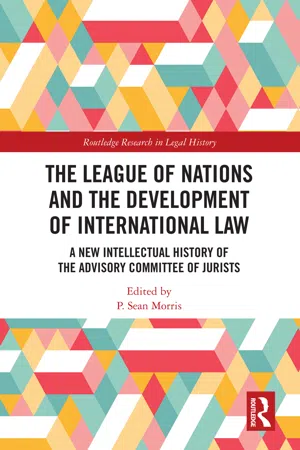
The League of Nations and the Development of International Law
A New Intellectual History of the Advisory Committee of Jurists
P. Sean Morris, P. Sean Morris
- 280 pagine
- English
- ePUB (disponibile sull'app)
- Disponibile su iOS e Android
The League of Nations and the Development of International Law
A New Intellectual History of the Advisory Committee of Jurists
P. Sean Morris, P. Sean Morris
Informazioni sul libro
This volume examines the contributions to International Law of individual members of the Advisory Committee of Jurists in the League of Nations, and the broader national and discursive legal traditions of which they were representative. It adopts a biographical approach that complements existing legal narratives.
Pre-1914 visions of a liberal international order influenced the post-1919 world based on the rule of law in civilised nations. This volume focuses on leading legal personalities of this era. It discusses the scholarly work of the ACJ wise men, their biographical notes, and narrates their contribution as legal scholars and founding fathers of the sources of international law that culminated in their drafting of the statute of the Permanent Court of International Justice, the forerunner of the International Court of Justice. The book examines visions of world law in a liberal international order through social theory and constructivism, historical examination of key developments that influenced their career and their scholarly writings and international law as a science.
The book will be a valuable reference for those working in the areas of International Law, Legal History, Political History and International Relations.